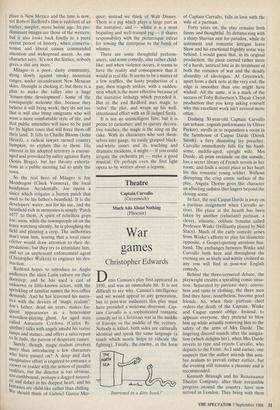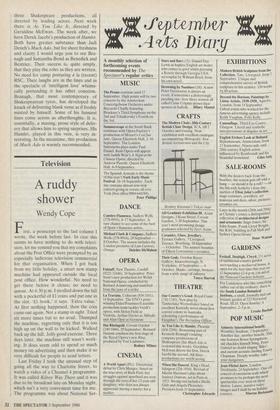Theatre
Captain Carvallo (Greenwich) Much Ado About Nothing (Phoenix)
War games
Christopher Edwards
Denis Cannan's play first appeared in 1950, and was an immediate hit. It is not difficult to see why. Cannan's intelligence and wit would appeal to any generation, but to post-war audiences this play must have provided a welcome diversion. Cap- tain Carvallo is a sophisticated romantic comedy set in a fictitious war in the middle of Europe in the middle of the century. Nobody is killed, both sides are culturally identical and speak the same language (a touch which neatly helps to ridicule the fighting). Finally, the enemy, in the form 'Interested in a dirty book?' of Captain Carvallo, falls in love with the wife of a partisan.
Forty years on, the play remains both funny and thoughtful. Its debates ring with a sharp Shavian zest for paradox, while its sentiment and romantic intrigue leave Shaw and his emotional frigidity some way behind. I would guess that, in its original production, the piece carried rather more of a harsh, satirical bite in its treatment of both the romance of war and the deadly absurdity of ideologies. At Greenwich, apart from a dark note at the very end, the edge is smoother than one might have wished. All the same, it is a mark of the success of Toby Robertson's Theatr Clwyd production that you keep asking yourself why this excellent work isn't revived more often.
Dashing 30-year-old Captain Carvallo (an urbane, roguish performance by Oliver Parker), strolls in to requisition a room in the farmhouse of Caspar Darde (Derek Smith), a fiery dissenting lay preacher. Carvallo immediately falls for his hand- some, middle-aged, upright wife. Mrs Darde, all prim rectitude on the outside, has a secret library of French novels in her room, and finds a secret place in her heart for this romantic young soldier. Without disrupting the crisp comic surface of the play, Angela Thorne gives this character an affecting sadness that lingers beyond the closing scene.
In fact, the real Caspar Darde is away on a partisan assignment when Carvallo ar- rives. His place at the hearth has been taken by another (reluctant) partisan, a clever, atheistic, celibate botanist called Professor Winke (brilliantly played by Neil Stacy). Much of the early comedy arises from Winke's efforts to play his diametric opposite, a Gospel-quoting uxorious hus- band. The exchanges between Winke and Carvallo both here and throughout the evening are as lively and wittily civilised as any you will find in post-war English comedy.
Behind the three-cornered debate, the playwright creates a spiralling comic situa- tion. Separated by patriotic duty, convic- tion and taste in clothing, the three men find they have, nonetheless, become good friends. So, when their partisan chief orders the death of the Captain, Winke and Caspar cannot oblige. Instead, to appease everyone, they pretend to blow him up while actually removing him to the safety of the arms of Mrs Darde. The lingering discord sounds after the assigna- tion (which delights her), when Mrs Darde reverts to type and rejects Carvallo, who departs to the Front. As I said earlier, one suspects that the author intends this som- bre realism to prevail rather earlier, but the evening still remains a pleasure and is recommended.
Kenneth Branagh and his Renaissance Theatre Company, after their irresistible progress around the country, have now arrived in London. They bring with them
three Shakespeare productions, all directed by leading actors. Next week there is As You Like It, directed by Geraldine McEwan. The week after, we have Derek Jacobi's production of Hamlet. Both have greater substance than Judi Dench's Much Ado, but for sheer freshness and clarity I would urge you to see Bra- nagh and Samantha Bond as Benedick and Beatrice. Their success is, quite simply, that they play the roles as they are written. No need for camp posturing a la (recent) RSC. Their laughs are in the lines and in the spectacle of 'intelligent love' whimsi- cally pretending it has other concerns. Branagh, that most contemporary of Shakespearean tyros, has developed the knack of delivering blank verse as if freshly minted by himself. Some of his funniest lines come across as afterthoughts. It is, essentially, a musing, prose style of deliv- ery that allows him to spring surprises. His Hamlet, played in this vein, is very in- teresting. In the meantime, this production of Much Ado is warmly recommended.











































 Previous page
Previous page